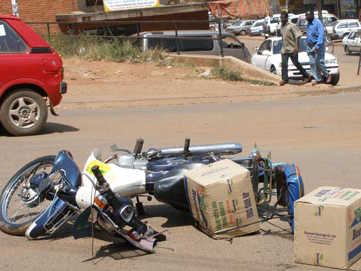Analysis
Boda boda accidents claim 62% of Mulago’s budget

Boda bodas accidents take a disproportionate part of Mulago’s surgery budget
A study on the “Impact of Bodaboda Motor Crashes on the Budget for Clinical Services at Mulago Hospital, Kampala,”by Kigera et al, and published in 2010 found that 75% of all Road Traffic accidents (RTC) involved Boda Bodas.
The study reviewed the records of 428 patients of Mulago National Referral Hospital that were involved in road traffic crashes between June and August of 2008 with a view to establishing the financial impact of boda bodas on the budget of the surgery department.
While a few years have passed since the study was released, the findings are no doubt still relevant as the number of boda bodas on Uganda’s roads, most especially in urban areas, has trippled.
Researchers found that boda bodas not only cost the lives of people, not to mention leaving many disabled, they impacted heavily on the resources of Mulago hospital’s surgery department.
The researchers found that Mulago spent up to Ushs 1.5 billion on treating boda boda victims in 2008. This accounted for 62.5% of the total budget of Mulago hospital’s directorate of surgery.
“This is a colossal sum of money to have been used up by one aspect of the greater field of surgery,” the researchers added: “The costs attributable to boda boda injuries comprise a significant 15% of the 10 billion shillings allocated to Mulago for health services and 4.2% of the total budget for Mulago for the year 2008/2009 (35 billion shillings).”
“This is a colossal sum given that Uganda is a developing economy and these funds could be utilized in other areas,” researchers recommended: “A reduction in the number of trauma cases seen at Mulago hospital most of which are from bodabodas, will free up space for the hospital to attend to other pressing matters.”
More worrying perhaps, the researchers found that majority (85%) of the victims of boda boda accidents are young people and mostly men, between ages 20 and 40. They also tended to suffer fatal injuries as compared to their counterparts who were in cars because of the fact that riders and passengers are directly exposed to the effect of collisions.
The 2013 Police Crime and Traffic Road Safety Report shows that majority 52% of all Road Traffic accidents happened in Kampala metropolitan region, which explains the high number of boda boda accident related admissions in Mulago.
The researchers blamed laxity by both law enforcement agencies as well as the motorcyclists in enforcing regulations regarding proper road user.
Recent measures by the Kampala Capital City Authority (KCCA) to improve the business of boda bodas in Kampala has faced a number of obstacles including from the police itself. About a year ago when KCCA was registering boda boda cyclists in Kampala, the Inspector General of Police came out and opposed the exercise citing security concerns.
However KCCA spokesperson Peter Kauju told The Sunrise that they are still committed to streamlining boda boda operations in Kampala.
“We are streamlining boda boda operations in Kampala. We have registered 54,000 boda boda riders but this number will go down when we complete the allocation of stages,” said Kauju.
Kauju added that they have developed a code of conduct for boda boda cyclists which they are set to launch in July 2014.
Kauju expressed optimism that in addition to sensitizing boda boda riders, the impact of boda bodas on the lives of Kampala people will significantly reduce.
Comments


















